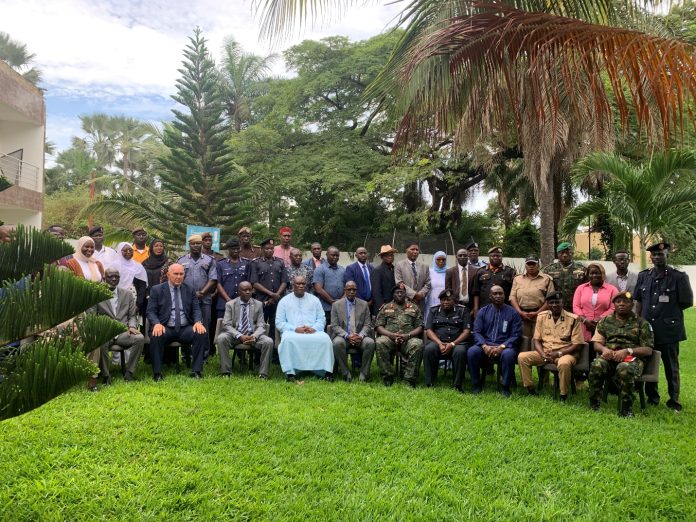By Mustapha Jallow
The Office of National Security (ONS), in collaboration with the Geneva Centre for Security Sector Governance (DCAF) on Tuesday held a 5-day discussion on developing a Standard Operating Procedure (SOP) for the country’s national security sector coordination model (NSSCM).
The discussion, according to the organizers, helps to provide standardised response guidelines for national security activities and operations, identifying key roles, responsibilities, and command structures for enhanced coordination between security institutions.
In August, this year, the Interior Ministry with DCAF, the European Union, and the Office of the National Security Adviser validated an Internal Security Policy (ISP) document which was meant to help address the security challenges gripping the nation.
As Gambia is doing everything possible to ensure that the security of the country is maintained and standardized, DCAF, EU, and GIZ are helping the country’s process to improve and meet the international standards of security system.
Held at a local hotel in Kotu, the session brought together ministers, diplomats, other senior government officials and heads of security from various institutions in helping strengthen further the capacity of the security actors on the need for collaboration, cooperation and partnership for effective and efficient service delivery.
“In national security, coordination is a challenge,” remarked Sering Modou Njie, minister of defence.
To mitigate this challenge, according to him, there is an increasing push on national security institutions to adopt a whole-of-government approach to problem-solving, adding this has led to the development of NSSCM.
Njie also talked about how the government has continued to support the SSR process, which sets out the parameters necessary to enable the fulfillment of legitimate security functions through reforms, restructuring, and institutional development.
He went further to explain how security becomes a collective responsibility, thus he added many institutions and agencies contribute to national security management, hence coordination of decision-making in terms of security and safety aspects is important.
The defence minister said in order to stay relevant and a step ahead of the security challenges in today’s fast-paced world, the need to continuously upgrade security capacities and skills is more critical than ever.
“I encourage each one of you to approach this workshop with an open mind and a willingness to embrace change. Take advantage of the knowledge shared here, engage with your peers, ask questions, and most importantly, apply what you will learn from this session,” he says.
Speaking on behalf of President Barrow, Abubakarr Suleiman Jeng, the national security adviser said threats to national security are multidimensional and multifaceted which requires a holistic approach.
He explained that the NSSCM arose from the need to provide a framework that will ensure the protection of The Gambia and to provide optimal safety and security delivery to citizens and residents.
“To achieve this in an increasingly complex environment and evolving security landscape, the threats to national security cannot be mitigated without a holistic approach as intended with the SOP to be developed,” adviser Jeng says.
Ken Isaac, DCAF chief in Banjul, highlighted some of the key successes they registered in supporting the country’s SSR, migration and border management.
Additionally, he added: “We have provided capacity-building support to SI’s especially the GPF and GID (under the Swiss funded project), and where we can, we extend to the wider security apparatus.”
He talked about DCAF dedication in enhancing security through more effective and accountable security and justice systems.


















